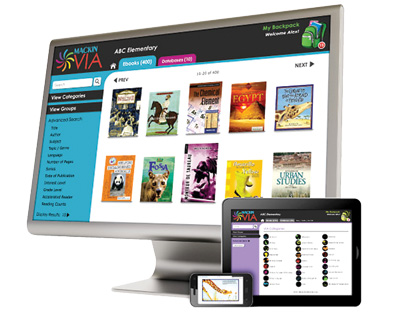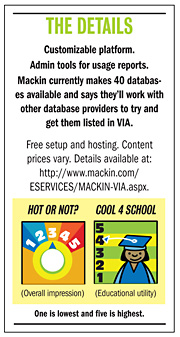Having just reviewed Follett’s suite of ebook-related products last month, it’s been interesting to compare how Mackin is serving up digital content they offer the pre-K–12 market, including the more than 37,000 unlimited, simultaneous access ebooks in its rapidly growing catalog. It’s especially interesting since lots of that content is available from both vendors. And, Mackin—like Follett—is  scrambling to evolve quickly and cater to increasingly econtent-savvy customers in order to grab as much of the emerging school library ebook market as possible. It’s a market that—fuse finally lit—could blow up big-time any moment now, at which point the vendor with the most established platform is bound to win big.
scrambling to evolve quickly and cater to increasingly econtent-savvy customers in order to grab as much of the emerging school library ebook market as possible. It’s a market that—fuse finally lit—could blow up big-time any moment now, at which point the vendor with the most established platform is bound to win big.
Mackin told me that its next big step in this frenzied evolution will be the release of a proprietary ereader “sometime next fall.” Until then, it has another interesting approach to hook customers: Mackin VIA. A free econtent platform, Mackin VIA serves as a single hub, providing access to all of the unlimited, simultaneous access ebooks and database content that its school libraries have purchased through the company—all through one unique URL that’s just a click away. That consolidation eliminates the need for users to log in to each discrete resource. Plus, since the majority of Mackin’s simultaneous access ebooks are nonfiction, students doing research can search their school library’s ebooks and databases at the same time. I like that, and so will classroom teachers, who are increasingly intent on the informational reading and research standards of the Common Core.
 Access to Mackin VIA content is online only, so ebooks can’t be downloaded for offline reading. There is, however, a feature called “My Backpack” into which students and teachers can toss their favorite titles for quick access when they’re connected. Librarians can also post “Groups,” shelves full of titles preselected to meet students’ needs.
Access to Mackin VIA content is online only, so ebooks can’t be downloaded for offline reading. There is, however, a feature called “My Backpack” into which students and teachers can toss their favorite titles for quick access when they’re connected. Librarians can also post “Groups,” shelves full of titles preselected to meet students’ needs.
Since all the content within VIA is licensed for unlimited, simultaneous access, everything is available 24/7; that means no holds and no waiting for titles to be virtually checked in.
Though Mackin VIA helps put a school library’s econtent in a single, customizable place—attractively browsable by category and searchable by title, author, subject, genre, interest and grade level, and lots more categories—VIA doesn’t rely on a single ereader interface to deliver ebooks. Instead, Mackin VIA opens ebooks in the ereaders its publishers provide.
The upside of that is obvious: interactive titles from publishers like TumbleBooks and Capstone Interactive Library, for example, open up in interfaces tailor-made for their advanced features like audio narration and autoplay.
The downside of such interface diversity is that functionality across devices is inconsistent. For example, while all the ereaders work well on conventional Windows desktops and laptops, try moving onto other devices and things get dicier. Some interactive ereaders employ Flash, for instance, rendering them useless on iOS devices, while others sport controls that work well with a mouse, but are just too cramped to tap through on a tablet. It’s also worth noting that, while Mackin bills VIA as “mobile friendly,” it’s really not. VIA isn’t available as a mobile app and was very frustrating to try and use on my iPhone’s browser. Plus, the text on most of the content isn’t reflowable or scalable, so most ebooks are all but unreadable on small screens.
Mackin’s ebook pricing varies, but many of the titles fall within the $30–$50 range—not bad for unlimited, simultaneous access. Though most of Mackin’s ebooks are yours to share forever, a few publishers, like TumbleBooks and Sesame Street, require annual subscription renewals.
No pre-K–12 vendor comes close to delivering school library econtent in the singular and seamless, device-agnostic way I feel is long overdue. But the one-stop convenience of VIA is definitely a great step forward in that evolution.
Correction: Mackin “VEE-ah” is the proper pronunciation of the product, and not “VYE-ah” as spoken in the following clip.



Mackin has informed me that the correct pronunciation of the product name is VEE-ah rather than VYE-ah.
K12 market is going to be one that takes some time. Mackin and Follett’s systems aren’t bad, but they aren’t great either. If either offers a proprietary reader, they’ll actually suffer. Librarians don’t want another reader to learn or use no more then they want 50 other reader platforms for eBooks. There are eBook standards for formats and as long as they ignore those, it’ll get worse, much worse. Plus the only thing either have done really is just be a channel for filtering content from the pub to the librarian, sure it is in one place, but what happens if they leave that vendor, can they still access the pubs content, if not, that’s bad. You mention hard to read on mobile, that’s because most of the eReaders are skinned adobe digital editions and most content pdf, doesn’t reflow or scale, ed pubs need to step away from this, not ideal. Someone else besides these two will offer something better, heck ebrary if they keep pushing into k12 already has a better system and reader, so does ebl… Tho they are academic now, ebrary has dabbled in k12 especially now part of proquest.